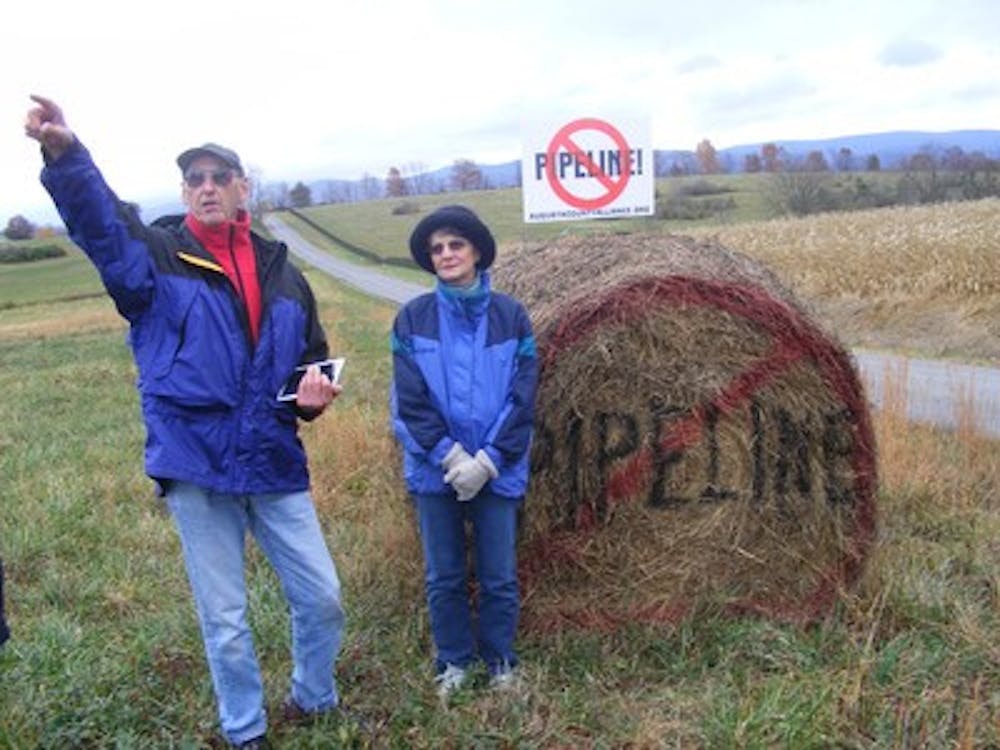McLean said some of the concerns she had with the project came from its potential to disrupt rural communities, posing risks of leakage that could contaminate the Lumbee River.
“It would have a big impact on people here and their property,” she said. “And when they cut down the trees, they took away the animal habitat. They made a lot of animals homeless here.”
Marvin Winstead, a farmer and environmentalist in Nash County, said even before construction began, he saw swarms of trees lie unattended after being felled to make way for the pipeline.
“There's a pine tree that's been in one of my fields my whole lifetime,” Winstead said. “I'm 69 years old and still remember seeing it when I was a 5-year-old child. That was one of the first things they wanted to cut down.”
The project would have negatively impacted endangered species, as well as soil and water exposed to construction, according to a news release by the Southern Environmental Law Center.
One 2017 ACP report estimated that during the first year of construction, local areas would have experienced soil loss by two to eight times of the standard erosion rates for subwatersheds.
Besides irreversibly impacting the productivity of local farms, the pipeline would also disproportionately expose Black and Indigenous people of color to hazardous conditions, Winstead said.
However, John Chaffee, former president and CEO of NCEast Alliance, an economic development corporation that adopted a resolution in support of the ACP in 2015, said if completed, the ACP project would have been a “net-good” for the state.
The pipeline would have built a reliable energy supply for eastern North Carolina and attract certain companies such as in baking and pharmaceutical industries, Chaffee said.
“Sometimes companies require natural gas because it's an ingredient to make a product,” he said. “In other instances, it's just the most efficient fuel for them to use to gain or modify a really accurate temperature.”
According to the Duke and Dominion press release, the project was also expected to create construction jobs and tax revenue for local communities.
Increased project cost, however, would raise customer costs to $20 billion, which may offset the advantages of jobs and tax revenue, according to a report by NC WARN.
To get the day's news and headlines in your inbox each morning, sign up for our email newsletters.
Climate clock
Besides the pipeline’s regional impact, Warren said people should consider the pipeline's possible effects on climate change.
“Collectively, all of us need to go faster because we're racing against the climate clock, and, you know, time is short,” he said.
However, Stephen Arbogast, director of the Kenan-Flagler Energy Center, said the cancellation of ACP is a setback for "effective decarbonization.”
“As the saying goes, ‘The perfect is the enemy of the good,’” Arbogast said.
In 2019, Duke Energy agreed to excavate nearly 80 million tons of coal ash from unlined to lined landfills following lawsuits and community activism across the state due to water contamination concerns.
Argobast said the natural gas pipeline would have helped Duke Energy retire coal plants and reach its goal of net-zero carbon emissions from electricity generation by 2050.
“To replace coal for now, I think they were counting on this pipeline to provide that natural gas at quite low costs, which would benefit the consumers in North Carolina, like keeping electricity prices down,” he said.
However, the fracking technique deployed by the project results in high methane emissions, which could contribute to a 13-percent increase in climate forcing, the difference between sunlight absorbed by Earth and energy radiated back into space, according to a 2019 report by Clean Water for North Carolina.
According to the Intergovernmental Panel on Climate Change, methane warms the planet by 86 times as much as carbon dioxide.
Future discussions
It is important for corporate and environmental groups to collaborate on mitigating climate change, Warren said.
“Maybe it's time that we find ways to work together rather than continue fighting,” he said. “We really need Duke and Dominion to put their enormous resources behind the global effort to rapidly phase out fossil fuels.”
To reconcile between climate strategies and the economy, people should also take a more nuanced approach, such as distinguishing less environmentally friendly pipelines that carry heavy oils from the ones that enable carbon-capture while carrying natural gas, Arbogast said.
Meanwhile, Warren said, addition of new technologies could make the energy transition more feasible.
“Utilities are moving straight from coal to renewables paired up with storage,” Warren said. “They also need to be accompanied by better energy-saving and energy-balancing technologies in programs which are totally proven and are economic to use."
In the press release, Duke and Dominion said the companies "remain steadfast in the belief that fuel diversity, including renewables, nuclear, and natural gas, is critical for reliably and sustainably serving our customers and communities."
Though this pipeline project has been canceled, Gendzier said developers should take its conflict-ridden tenure with a warning, and the lesson that future projects need to incorporate public opinions.
“Developers that have projects like this and the agencies that are permitting them should take seriously the concerns of the public that are raised,” he said. “Protecting the legal avenues for public participation in these permitting processes is also very important.”
@CrystalYu_
@DTHCityState | city@dailytarheel.com




